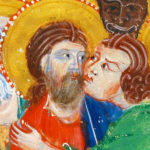We run our website the way we wished the whole internet worked: we provide high quality original content with no ads. We are funded solely by your direct support. Please consider supporting this project.
What is the significance of Isaiah 38:1–5?
God tells Hezekiah “you shall die: you shall not recover” (vs. 1). Hezekiah pleads with God and God decides to “add fifteen years” to his life.
As we noted concerning 2 Kings 20:1–5, if God foreknew that he wasn’t going to end Hezekiah’s life, his declaration that he intended to do so and his decision to “add” years to Hezekiah’s life seems disingenuous. According to the classical view, however, the length of Hezekiah’s life was foreknown by God all along.
Category: Q&A
Tags: Open Theism, Q&A
Topics: Open Theism
Verse: Isaiah 38
Related Reading

The God Who Over-Knows The Future
God perfectly knows from all time what will be, what would be, and what may be. He sovereignly sets parameters for all three categories. His knowledge of what might occur leaves him no less prepared for the future than his knowledge of determined aspects of creation. Because he is infinitely intelligent, he does not need…

Did God Predestine Judas to Betray Jesus? (podcast)
Greg talks about the role Judas played in the crucifixion of Jesus and speculates about his potential for good. Episode 516 http://traffic.libsyn.com/askgregboyd/Episode_0516.mp3

Does God Intervene?
The Open View of the future recognizes the vast influence of all the angelic and human wills God created, which, in turn, influences the various outcomes and circumstances in life. Therefore life is arbitrary because of the way the decisions made by an unfathomably vast multitude of free agents intersect with each other. How life…

5 Observations about God Changing His Mind
One of the most significant passages that supports the open view of the future is found in Jeremiah 18. This is one of the numerous times where we find God changing his mind in response to events. By definition, one cannot change what is permanently fixed. Hence, every time the Bible teaches us that God…

How do you respond to Isaiah 44:28–45:1?
This passage is one of the most persuasive evidences of divine foreknowledge in the Bible. The verse proclaims the Lord as the one “who says to Cyrus, ‘He is my shepherd, and he shall carry out all my purpose’; and who says of Jerusalem, ‘It shall be rebuilt,’ and of the temple, ‘Your foundation shall…
